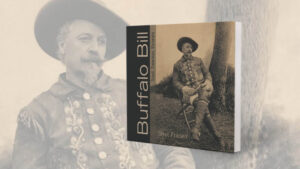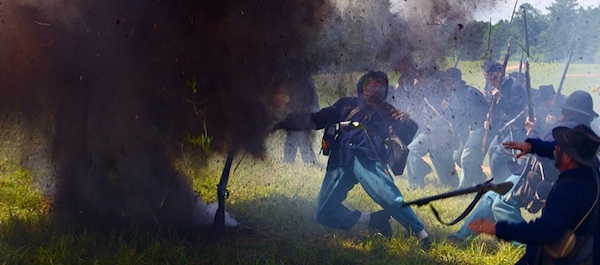
Civil War: The Untold Story is a five-hour documentary from Great Divide Pictures, which has produced award-winning historical documentaries such as How the West Was Lost and visitor center films for several Civil War National Parks. Currently scheduled to air in the first quarter of 2014, Civil War: The Untold Story is produced and directed by Chris Wheeler. HistoryNet talked with him recently about the project.
HistoryNet: Your documentary is titled Civil War: The Untold Story. With all that has been written about the war, and all the documentaries that have been done, what is your “Untold Story”?
Chris Wheeler: It’s really on multiple levels. Instead of focusing on the Virginia-Maryland-Pennsylvania campaign, we’re telling the story of the Civil War through the lens of the Western Theater, the area between the Appalachians and the Mississippi River: Fort Donelson, Shiloh, Vicksburg, Chickamauga, Chattanooga, and the Atlanta Campaign. While it is not entirely an untold story, the story of that part of the war is not told very often. Many historians believe the Western Campaign is where the war was won and lost. We’re not going to ignore the East; we’ll briefly mention events there and put them in perspective within what’s happening in the West.
HN: There is a widespread belief that the seat of war was in the Virginia-Maryland-Pennsylvania region, and that everything that happened in the Western Theater was simply a sideshow. Why do you think it is that the Western Theater gets less respect?
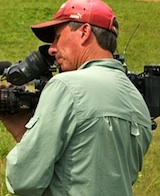 CW: I think there’s no denying the Eastern Theater was very important—the catastrophic loss of life makes it tragic, and that alone brings attention to the East, and deservedly so. It would be wrong for us to ignore the Eastern Theater, but we are focusing on the West. The war in the East was fought in a highly populated area around the capitals of Washington and Richmond. The media—newspapers and magazines—had very easy access to the Eastern Theater, and so logically it was covered more extensively at the time.
CW: I think there’s no denying the Eastern Theater was very important—the catastrophic loss of life makes it tragic, and that alone brings attention to the East, and deservedly so. It would be wrong for us to ignore the Eastern Theater, but we are focusing on the West. The war in the East was fought in a highly populated area around the capitals of Washington and Richmond. The media—newspapers and magazines—had very easy access to the Eastern Theater, and so logically it was covered more extensively at the time.
The lands between the Appalachians and Mississippi River were not the frontier by that time, but it was rougher country. Journalists had to cover hundreds of miles, from Fort Donelson to Shiloh to Vicksburg, eastward to Tennessee and onward to Atlanta. So the Western Campaign didn’t get nearly the media coverage at the time the war was happening. I think that is part of the reason the West has gotten short shrift when it comes to interpreting the Civil War.
HN: Most of the photographers’ studios were in the East as well. It’s not as easy to find photos taken in the Western Theater.
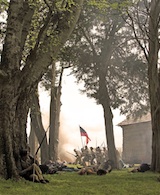 CW: The reality is that there are very few photographs that cover the West. We use battle recreations in the documentary to tell the story. If we had to depend on period photos we wouldn’t have much to tell. I believe Ken Burns has been criticized for not doing more to cover the Western Theater in his series on the Civil War, but I think such criticism is unfair. You have to have images to make compelling television.
CW: The reality is that there are very few photographs that cover the West. We use battle recreations in the documentary to tell the story. If we had to depend on period photos we wouldn’t have much to tell. I believe Ken Burns has been criticized for not doing more to cover the Western Theater in his series on the Civil War, but I think such criticism is unfair. You have to have images to make compelling television.
HN: We’ve seen a media release about your documentary series that says, “It’s not just about who we were then. It’s about who we are now.” Would you like to expand on that thought?
CW: This film is not just a historical retelling of arguably the most important event in our country’s history. Hopefully our series will resonate with viewers and help Americans realize that many of the issues we fought over in the Civil War are still being discussed today: states rights versus a strong centralized government; civil rights; the Constitution; issues of race. A lot of these things still remain unresolved. Hopefully, after watching, viewers will have a better understanding of these issues and understand how the history of the Civil War remains relevant to all Americans today.
HN: The series will be narrated by someone very familiar to viewers of the PBS series Downton Abbey— actress Elizabeth McGovern. What led you to approach her about being the narrator?
 CW: I’ve worked with Peter Coyote in the past; his agent also represents Elizabeth McGovern. I heard a demo of her doing some voice work, and I thought Elizabeth struck the perfect tone for what we’re trying to get across. She has a strong delivery but also a natural empathy. Elizabeth brings a sense of calm to this story while taking viewers through the horror, the carnage of the Civil War. One hundred fifty years later, it’s still hard to get your head around how truly horrible this war was. Elizabeth is a calming presence who in essence, takes viewers on a journey through hell.
CW: I’ve worked with Peter Coyote in the past; his agent also represents Elizabeth McGovern. I heard a demo of her doing some voice work, and I thought Elizabeth struck the perfect tone for what we’re trying to get across. She has a strong delivery but also a natural empathy. Elizabeth brings a sense of calm to this story while taking viewers through the horror, the carnage of the Civil War. One hundred fifty years later, it’s still hard to get your head around how truly horrible this war was. Elizabeth is a calming presence who in essence, takes viewers on a journey through hell.
Our series includes female historians who are very good on camera, but most of the voices in our documentary, whether historians or the voices from diaries and letters of the time, are male. A female narrator such as Elizabeth McGovern, brings much needed balance to the narrative.
Civil War: The Untold Story is being distributed to public television stations by American Public Television, but stations are not required to air the series. So from a distribution perspective, having Elizabeth involved in the show will hopefully encourage PBS stations to broadcast it.
HN: Tell us a bit about your own background if you will.
CW: I started off in the television business in 1981 as a news photographer. I loved history but wasn’t sure I wanted to be a teacher. My first big project came when I was given the opportunity to create How the West Was Lost for the Discovery Channel. Since then I’ve produced films on the Korean War (Our Time in Hell: the Korean War) and a documentary narrated by Walter Cronkite on John Glenn (Godspeed, John Glenn). I’ve continued to produce documentaries on Native Americans. In recent years we’ve had the opportunity to produce visitor center films for National Park Civil War battlefields, and that has given me the chance to tell some of these stories that are so dramatic and so important to America today.
To return to your question about “What is the untold story?” we also want to bring a strong presence to the African American story in the Western Theater. At Kennesaw Mountain National Battlefield Park in Georgia, for example, I asked staff members if they receive a lot of African American visitors, since the park is just outside Atlanta. They replied “No. Unfortunately, African Americans do not feel like they are part of the story of the Civil War.” To me, that is tragedy. And it has been a motivating factor for us to tell a produce a series that conveys to modern day African Americans that their ancestors were an important and inspirational part of the Civil War story.
HN: It is often claimed that Lincoln’s Emancipation Proclamation didn’t free a single slave, but in fact it freed Army officers from having to return runaway slaves to their owners as the armies penetrated deeper into the South, and allowed many, many thousands of slaves to find freedom by getting behind Union lines—”contrabands,” they were called. That was particularly true with the Western armies, which conquered the largest portion of Dixie.
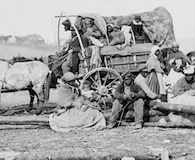 CW: I really liked the story of the contrabands, which we go into in our second episode. Early in the war, slaves began escaping to Union lines. Thousands of them! No one in the North had anticipated escaping slaves seeking refuge in these kinds of numbers. It led to a Constitutional question central to the war: Lincoln never recognized the Confederacy, so Federal law still applied to rebelling states. The Fugitive Slave Act was still the law of the land, so by law, runaway slaves had to be returned to their owners. But as a Union army officer, do you want to return the escaping slaves back over to the very people with whom you are engaged with in battle?
CW: I really liked the story of the contrabands, which we go into in our second episode. Early in the war, slaves began escaping to Union lines. Thousands of them! No one in the North had anticipated escaping slaves seeking refuge in these kinds of numbers. It led to a Constitutional question central to the war: Lincoln never recognized the Confederacy, so Federal law still applied to rebelling states. The Fugitive Slave Act was still the law of the land, so by law, runaway slaves had to be returned to their owners. But as a Union army officer, do you want to return the escaping slaves back over to the very people with whom you are engaged with in battle?
Lincoln is credited as the Great Emancipator, and certainly he was, but the slaves themselves put Lincoln in the position where he had to do something, and that was the Emancipation Proclamation. Most people don’t realize the Emancipation Proclamation also gave African Americans the right to join the army and fight for the Union and defend their new-found freedom.
In our series, we also want to tell little-known stories about Lincoln himself. He was a man of the West, so he had a pretty good understanding of why the Western Campaign was so important—perhaps more so than most others in Washington did. Steven Spielberg’s movie Lincoln begins in January 1865; our documentary ends about where Spielberg’s movie begins, so The Untold Story could be considered a prequel to Spielberg’s film, showing Lincoln’s ups and downs—secession, the military campaigns, the Emancipation Proclamation, and the crucial 1864 presidential campaign.
I don’t think Americans today realize how close Lincoln came to not being reelected. His opponent was George McClellan, the popular former commander of the Army of the Potomac. McClellan represented a Democratic party that wanted to end the war, to let the Southern states keep their slaves and come back into the Union. By 1864, Northerners were tired of the war that had no end in sight, tired of seeing their sons die. One of the biggest events that turned things around was in September 1864, when Union General William T. Sherman captured Atlanta, which was the next-best thing to capturing Richmond. For the first time, people in the North now had hope this war could be won. The Battle of Atlanta plays very much into the political campaign story we tell in “Civil War: the Untold Story.” Lincoln wins in a landslide. Just a few weeks earlier he had told his cabinet, “We must prepare for McClellan to be president.”
HN: How will civilians’ stories figure into the documentary?
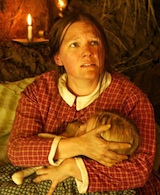 CW: The story of Southern civilians is a big part of the “untold story”. I don’t think a lot of people in our nation today realize that the war was fought almost entirely in the South. Civilians in places like Vicksburg, Chattanooga, and Atlanta found themselves in the path of the war. Vicksburg is perhaps the most dramatic example, with the civilian population trapped there for six weeks under bombardment during the siege in 1863 by Ulysses S. Grant’s army. The experience for Southern civilians was very different than for Northern civilians. Northern civilians could read about what was happening in the war, but it was fought on Southern doorsteps, and it devastated the South for years afterward.
CW: The story of Southern civilians is a big part of the “untold story”. I don’t think a lot of people in our nation today realize that the war was fought almost entirely in the South. Civilians in places like Vicksburg, Chattanooga, and Atlanta found themselves in the path of the war. Vicksburg is perhaps the most dramatic example, with the civilian population trapped there for six weeks under bombardment during the siege in 1863 by Ulysses S. Grant’s army. The experience for Southern civilians was very different than for Northern civilians. Northern civilians could read about what was happening in the war, but it was fought on Southern doorsteps, and it devastated the South for years afterward.
So in Civil War: The Untold Story, you’ll see the military story, the social story of the civilians and African Americans, and the political story of Abraham Lincoln.
HN: Is there anything you’d like to add in closing?
CW: I hope this series brings our country’s people together at a time when we are arguably as divided as we were in 1860. I hope it will bring a better understanding of the Civil War and help people to see what happens when we disagree, when we stop trying to solve our problems together. I think it is time for Americans to hear this story again, not just because it is the 150th anniversary of the war, but because of the state of our nation today. Ken Burns did a fantastic job of telling the story of the war in 1990, but it has been a generation since our nation heard the story of the Civil War. I sincerely hope a sense of healing and unity can come out of viewing this. Over 600,00 young men died from North and South. It is an American tragedy, one Americans should never forget.
Click here to watch a trailer of Civil War: The Untold Story.
[nggallery id=143]



